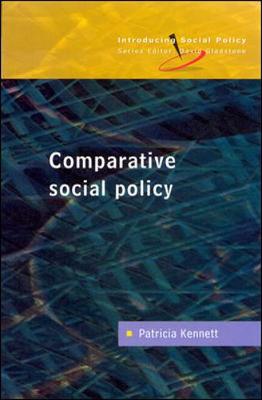* What are the social policy processes and outcomes across different societies?
* How are these shaped by social and economic conditions?
* What are the limitations and potential of cross-national research?
Comparative Social Policy explores the new context of social policy and considers how cross-national theory and research can respond to the challenges facing welfare. These challenges include changing demographic trends and economic conditions which have been accompanied by the emergence of new needs and risks within and across societies. This book extends and deepens cross-national research by exploring the theoretical and conceptual frameworks through which...Read more
* What are the social policy processes and outcomes across different societies?
* How are these shaped by social and economic conditions?
* What are the limitations and potential of cross-national research?
Comparative Social Policy explores the new context of social policy and considers how cross-national theory and research can respond to the challenges facing welfare. These challenges include changing demographic trends and economic conditions which have been accompanied by the emergence of new needs and risks within and across societies. This book extends and deepens cross-national research by exploring the theoretical and conceptual frameworks through which social policy and welfare systems have been understood. It critically examines different policy processes and welfare outcomes, as well as the ethnocentricism and cultural imperialism which has permeated cross-national epistemology and methodology. The author concludes by reflecting on how cross-national research can illuminate the complex and diverse processes leading to discrimination and inequality across borders. This leads to a consideration of how it can contribute to the implementation of welfare provision appropriate to the social and economic conditions of contemporary societies. Comparative Social Policy is an essential text for undergraduate and masters level students of social policy, and an invaluable reference for researchers embarking on cross-national social research.
* How are these shaped by social and economic conditions?
* What are the limitations and potential of cross-national research?
Comparative Social Policy explores the new context of social policy and considers how cross-national theory and research can respond to the challenges facing welfare. These challenges include changing demographic trends and economic conditions which have been accompanied by the emergence of new needs and risks within and across societies. This book extends and deepens cross-national research by exploring the theoretical and conceptual frameworks through which social policy and welfare systems have been understood. It critically examines different policy processes and welfare outcomes, as well as the ethnocentricism and cultural imperialism which has permeated cross-national epistemology and methodology. The author concludes by reflecting on how cross-national research can illuminate the complex and diverse processes leading to discrimination and inequality across borders. This leads to a consideration of how it can contribute to the implementation of welfare provision appropriate to the social and economic conditions of contemporary societies. Comparative Social Policy is an essential text for undergraduate and masters level students of social policy, and an invaluable reference for researchers embarking on cross-national social research.
- ISBN13 9780335201242
- Publish Date 16 August 2001 (first published 1 January 2001)
- Publish Status Out of Print
- Out of Print 17 November 2004
- Publish Country GB
- Imprint Open University Press
- Format Hardcover
- Pages 160
- Language English
